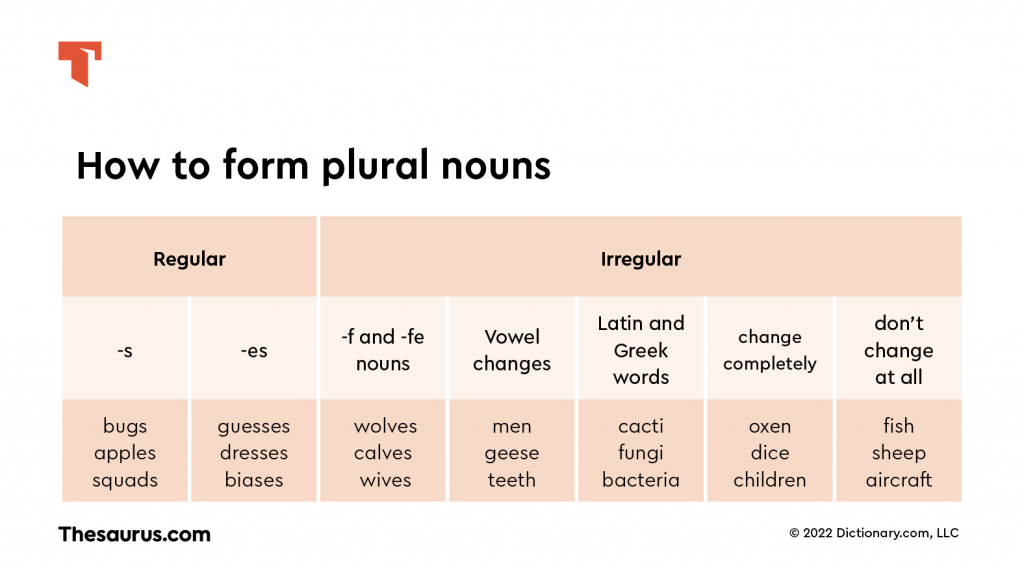Pop quiz! Do you have any pets? Do you have any siblings? Do you have sore feet? Have you brushed your teeth today? Are you afraid of mice? Don’t worry, there are no wrong answers. As you took our silly quiz, you may have noticed something strange going on. Our little quiz used several different nouns, words we use to refer to people, places, and things. We use many different types of nouns, but the nouns in our quiz are all of the same type: plural nouns. If they are all plural nouns then why do some of them look so odd? Plural nouns are an especially tricky type of noun that don’t always play by the rules, so let’s take a moment to learn more about them.
What is a plural noun?
The word plural is used in grammar to mean “noting or pertaining to a member of the category of number, found in many languages, indicating that a word has more than one referent.” So, a plural noun is a noun that refers to more than one of something.
For example, the word cats is a plural noun because it refers to more than one animal. On the other hand, the word dog is not a plural noun because it only refers to a single animal. A noun that only refers to one of something is called a singular noun. For the most part, you should be able to identify most plural nouns if you remember that they refer to more than one of something. Notably, plural nouns cannot follow the articles a and an and always use plural verbs (such as are, were, and do).
What is a regular plural noun?
The general rule of plural nouns is that they are created by adding the letter S to the end of a singular noun. For example, you take the singular noun apple and add an S to make the plural noun apples. When comparing singular and plural nouns, we can often say that the plural noun is the “plural of X singular noun.” For example, the noun bugs is the plural of the singular noun bug.
For singular nouns that already end in S, we instead add the ending –es. For example, we add –es to the end of the singular noun bus to make the plural noun buses. You can see the same thing happening in words like guesses, dresses, biases, and losses.
We refer to plural nouns that follow these simple rules as regular plural nouns.
Some words are a bit trickier and don’t follow these rules exactly or may change spelling when made into a plural noun. For example, the plural of marsh is marshes, and the plural of baby is babies.
Take note that just because a noun ends in –s or -es doesn’t mean it is a plural noun. For example, the words James, glass, and bias are all not plural nouns.
What is an irregular plural noun?
Now we get to the plural nouns that love to cause everyone problems. Irregular plural nouns do not follow the rules mentioned above that most plural nouns follow. Instead, these troublesome nouns break the rules and you will need to simply learn and memorize them as you see them.
Irregular plural noun examples
While there is no one, single general rule that binds all irregular plural nouns together, we can separate them into some particular groups.
-f and -fe nouns
For these irregular plural nouns, we drop the final -f or -fe in the singular noun and replace it with the ending -ves.
- -f nouns: wolf becomes wolves, calf becomes calves, half becomes halves
- -fe nouns: wife becomes wives, knife becomes knives, life becomes lives
Frustratingly, not every singular noun ending in -f or -fe becomes an irregular plural noun. For example, the plural of roof is roofs and the plural of safe is safes. Thanks, English.
Vowel changes
Some singular nouns become plural nouns by changing vowels in the middle of the word. There is no rule or pattern that tells you when this happens. You will just have to learn which words do this as you discover them.
- man becomes men, goose becomes geese, tooth becomes teeth, foot becomes feet
Latin and Greek words
Singular nouns that come from Latin or Greek often change spelling when used as plural nouns.
- cactus becomes cacti, stimulus becomes stimuli, fungus becomes fungi
- bacterium becomes bacteria, referendum becomes referenda
- axis becomes axes, basis becomes bases, stasis becomes stases
Words that change completely
Some irregular plural nouns don’t follow any specific trends at all when compared to their corresponding singular noun versions.
- singular: mouse; plural: mice
- singular: louse; plural: lice
- singular: person; plural: people
- singular: ox; plural: oxen
- singular: child; plural: children
- singular: die; plural: dice
Words that don’t change at all
Some irregular plural nouns are identical to their singular noun counterparts. For these plural nouns, you must use context to determine if the word actually is a plural noun.
- fish, sheep, moose, tuna, deer, buffalo, shrimp, series, species, offspring, aircraft
List of regular and irregular plural nouns
Listed below are many different plural nouns that refer to people, places, and things. As you read them, think about what singular nouns would be used in their place and if they are regular or irregular plural nouns.
- people: clowns, bosses, actors, actresses, women, gangs, squads, enemies
- animals: goats, cows, chickens, swine, sheep, oxen, moose, salmon, trout, geese
- places: towns, villages, beaches, cities, communities, countries
- things: wallets, coins, cakes, lamps, keys, parties, foci, data, criteria, minutiae, insecurities, categories, insignia, athletics, pants
Now you are ready to take this quiz on regular and irregular plural nouns.
You’ll be a regular genius with this tool!
Improve your writing with Thesaurus.com’s Grammar Coach™, which catches grammar and spelling errors and provides Thesaurus-powered synonym suggestions. Using machine learning, this tool can definitely spot the difference between regular and irregular nouns—and more!
Whether you’re writing about a person, place, or thing, start writing smarter today!
















